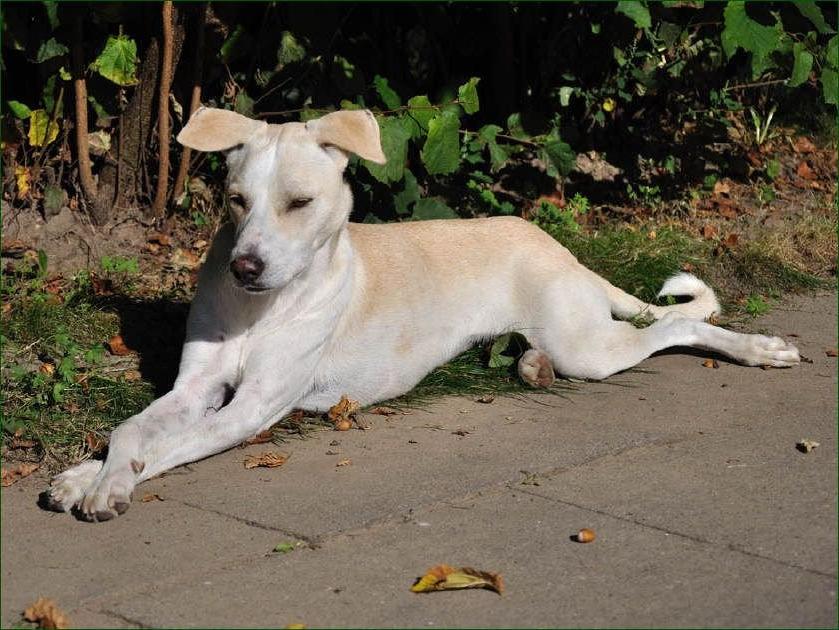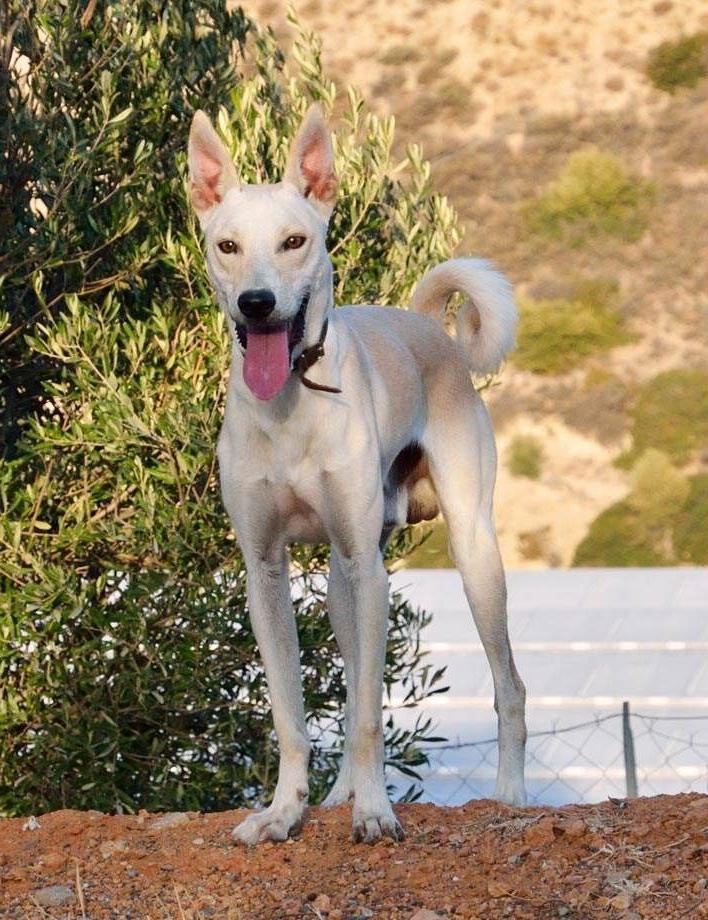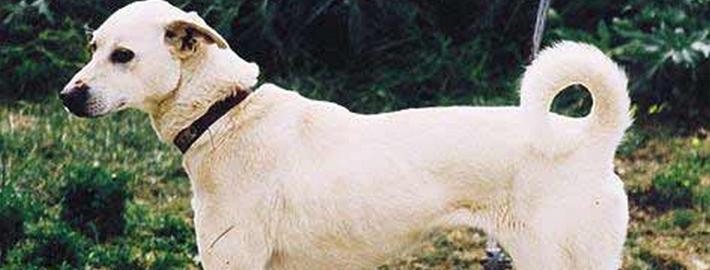- Breed Category: Hound
- Country of Origin: Greece
- Average Height: Males 50-60 cm, Females 48-58 cm
- Average Weight: Males 20-30 kg, Females 18-28 kg
- Average Life Span: 12-14 years
- Grooming Requirements: Low, occasional brushing
- Exercise Requirements: High, needs daily exercise
- Coat Type: Short and smooth
- Coat Color Variations: Fawn, black, brindle
- Shedding Level: Moderate
- Ear Type: Semi-erect
- Tail Type: Curved, carried high
- Temperament: Intelligent, alert, loyal
- Intelligence Level: High
- Barking Tendency: Low
- Compatibility with Children: Good with proper socialisation
- Compatibility with Other Pets: Generally good, may chase small animals
- Training Ease: Moderate, requires consistency
- Common Health Issues: Generally healthy, watch for hip dysplasia
- Dietary Needs: High-quality diet, balanced nutrition
- Energy Level: High
- Drooling Tendency: Low
- Sensitivity to Weather: Sensitive to cold
- Overall Maintenance Level: Low
- Original Purpose: Hunting and tracking
- Apartment Friendly: Not ideal, needs space
- Best Suited For: Active families, rural settings
- Cost of Ownership: Moderate
- Unique Traits: Excellent scenting ability
The Cretan Hound, an ancient breed from the Greek island of Crete, is a fascinating dog with a rich history and unique characteristics. Known for its agility and keen hunting instincts, this breed has been a loyal companion to hunters for centuries. As one expert notes, “The Cretan Hound is not just a dog; it’s a piece of living history.”
This article aims to inform readers about the Cretan Hound’s distinctive traits, its storied past, and how to care for this remarkable breed. With roots tracing back over 4,000 years, the Cretan Hound is one of the oldest hunting breeds in Europe. Its history is intertwined with the island’s culture, making it a symbol of Crete’s heritage.
Early Development and Cultural Significance of the Cretan Hound

Early Development of the Breed
The Cretan Hound has roots that stretch back thousands of years, making it one of the oldest breeds in Europe. Its development was shaped by the rugged terrain of Crete, where agility and endurance were essential. Over time, these dogs were selectively bred for their keen sense of smell and speed, traits that made them exceptional hunters.
Role in Hunting and Traditional Cretan Culture
In Crete, hunting was not just a pastime but a way of life. The Cretan Hound played a crucial role in this tradition, known for its ability to track and capture prey with remarkable precision. Beyond hunting, these dogs were woven into the fabric of Cretan culture, often depicted in ancient art and literature as symbols of loyalty and skill.
Key Historical Figures and Events
Throughout history, the Cretan Hound has been associated with notable figures and events. Ancient texts and artefacts suggest that these dogs were prized by Minoan civilisation, and later, they caught the attention of European nobility. Their reputation as skilled hunters spread far beyond Crete, influencing breeding practices across the continent.
Physical Characteristics
The Cretan Hound is a medium-sized dog, known for its lean and athletic build. Its coat is short and smooth, often in shades of fawn, black, or brindle. The breed’s distinctive features include a long, narrow head and expressive eyes, which give it an alert and intelligent appearance. These physical traits, combined with its agility, make the Cretan Hound a remarkable sight in motion.
Unique Physical Traits
The Cretan Hound is not just about looks; it’s built for speed and agility. This breed can move with a grace that’s almost poetic, thanks to its lean muscles and streamlined body. Its long legs and flexible joints allow it to navigate the rugged terrains of Crete with ease, making it a natural athlete. Whether sprinting across open fields or weaving through dense forests, the Cretan Hound is a master of its environment.
Temperament and Behaviour
When it comes to temperament, the Cretan Hound is a blend of intelligence and independence. These dogs are known for their sharp minds and quick learning abilities, making them responsive to training. However, they also have a streak of independence, which means they appreciate a bit of freedom. Social and friendly, they get along well with families and other pets, but they do have a strong prey drive, so early socialisation is key. Their loyalty and protective nature make them excellent companions, always ready to alert their owners to anything unusual.
Personality Traits and Suitability

Typical Personality Traits
The Cretan Hound is a fascinating mix of loyalty, intelligence, and strong hunting instincts. These dogs are incredibly devoted to their families, often forming deep bonds with their owners. Their intelligence shines through in their quick learning and problem-solving abilities, making them a joy to train. However, their hunting instincts are strong, so they thrive in environments where they can exercise these natural skills.
Suitability as a Family Pet and Hunting Companion
As a family pet, the Cretan Hound is both affectionate and protective. They are well-suited to active families who can provide plenty of exercise and mental stimulation. As hunting companions, they are unparalleled, with a natural ability to track and capture prey. Their versatility makes them a great choice for those who enjoy outdoor activities.
Interaction with Children and Other Animals
These dogs are generally good with children, displaying patience and gentleness. However, due to their prey drive, early socialisation is crucial to ensure they get along well with other animals. With the right training, they can coexist peacefully with other pets.
Training and Exercise Needs
The Cretan Hound requires regular exercise to keep both body and mind healthy. They enjoy activities that challenge their agility and intelligence, such as agility courses or scent work. Training should be consistent and positive, as they respond well to encouragement and rewards. A well-exercised Cretan Hound is a happy and well-behaved companion.
Training, Exercise, and Health of the Cretan Hound

Importance of Early Training and Socialisation
Getting a Cretan Hound off to a good start with early training and socialisation is crucial. These dogs are intelligent and independent, so introducing them to various environments, people, and other animals early on helps them grow into well-rounded adults. This early exposure curbs their strong prey drive and ensures they adapt well to family life.
Recommended Training Techniques
When it comes to training, positive reinforcement is the way to go. These dogs respond well to rewards and encouragement, making them eager learners. Consistency is key, so regular training sessions that are short and engaging work best. Incorporating games and challenges keeps their sharp minds stimulated.
Daily Exercise Requirements and Activities They Enjoy
The Cretan Hound is an active breed that thrives on daily exercise. They love activities that test their agility and intelligence, like agility courses or scent games. A good run in a secure area or a long walk in varied terrain keeps them happy and healthy. Regular exercise is essential to prevent boredom and maintain their athletic build.
Health and Lifespan
Generally healthy, the Cretan Hound has a lifespan of around 12 to 14 years. Regular vet check-ups and a balanced diet are important to keep them in top shape. Like any breed, they can be prone to certain genetic conditions, so responsible breeding and regular health screenings are recommended.
Health and Care of the Cretan Hound

Common Health Issues
The Cretan Hound is generally a healthy breed, but like all dogs, they can be prone to certain health issues. Hip dysplasia and eye conditions are occasionally seen, so regular vet check-ups are essential. Keeping an eye on their weight and ensuring they have a balanced diet can help prevent obesity-related problems.
Average Lifespan and Health Tips
With a lifespan of 12 to 14 years, the Cretan Hound can be a long-term companion. To keep them healthy, provide a nutritious diet, regular exercise, and mental stimulation. Regular vet visits for vaccinations and health screenings are crucial to catch any potential issues early.
Preventative Care Recommendations
Preventative care is key to a healthy Cretan Hound. Regular dental care, flea and tick prevention, and maintaining a healthy weight are all important. Consider joint supplements if recommended by your vet, especially as they age.
Grooming and Maintenance
The Cretan Hound’s short coat is low-maintenance, requiring only occasional brushing to remove loose hair. Regular nail trimming, ear cleaning, and dental care should be part of their routine. Bathing is only necessary when they get particularly dirty.
Coat Care and Grooming Routines

Shedding and Seasonal Grooming Tips
The Cretan Hound’s short coat is a breeze to maintain. While they don’t shed excessively, a weekly brush will help keep their coat looking sleek and remove any loose hairs. During shedding seasons, usually in spring and autumn, you might want to brush them a bit more often to manage the extra hair. A good quality bristle brush or grooming mitt works wonders.
Diet and Nutrition
Feeding your Cretan Hound a balanced diet is crucial for their health and vitality. Opt for high-quality dog food that meets their nutritional needs, focusing on protein to support their active lifestyle. Fresh water should always be available. Keep an eye on their weight, as these agile dogs can be prone to obesity if overfed. Treats are fine in moderation, especially when used as rewards during training sessions.
Nutritional Needs and Feeding Guidelines for the Cretan Hound
Nutritional Needs for Optimal Health
The Cretan Hound thrives on a diet rich in protein, essential for maintaining their lean muscle mass and supporting their active lifestyle. Look for high-quality dog food with meat as the primary ingredient. Omega-3 and Omega-6 fatty acids are also beneficial for their coat and skin health.
Foods to Include and Avoid
Include lean meats, fish, and vegetables in their diet. Avoid foods high in fillers, artificial additives, and excessive grains, as these can lead to digestive issues. Fresh fruits like apples and blueberries can be given as occasional treats, but steer clear of grapes and chocolate, which are toxic to dogs.
Feeding Schedules and Portion Recommendations
Feed your Cretan Hound twice a day to maintain energy levels and prevent bloating. Portion sizes depend on their age, weight, and activity level, so consult your vet for personalised advice. Always ensure fresh water is available.
Fun Facts and Trivia
Did you know the Cretan Hound is one of the oldest dog breeds in Europe? Their history dates back over 4,000 years, making them a living piece of ancient history. Despite their hunting prowess, they are known for their gentle nature with family members.
Interesting Tidbits and Famous Cretan Hounds

Interesting Tidbits about the Breed
The Cretan Hound is not just a dog; it’s a piece of living history. With roots tracing back over 4,000 years, this breed is one of the oldest in Europe. Known for its agility and keen hunting instincts, the Cretan Hound has been a loyal companion to hunters for centuries. Its ability to adapt to the rugged terrain of Crete is legendary, making it a natural athlete. These dogs are also known for their unique vocalisations, often described as a mix between a bark and a howl, which they use to communicate during hunts.
Famous Cretan Hounds in Media or History
While the Cretan Hound may not be as widely recognised in popular media as some other breeds, it has made its mark in history. Ancient Minoan frescoes and artefacts often depict these dogs, highlighting their importance in Cretan society. In more recent times, the breed has been featured in documentaries exploring ancient dog breeds, showcasing their unique traits and historical significance. Their reputation as skilled hunters has also been noted in various hunting journals and books, cementing their status as a breed of distinction.
Final Thoughts
The Cretan Hound is a living testament to ancient hunting prowess. This breed’s rich history and unique traits make it a remarkable companion for those who appreciate its heritage. Balancing its high energy and intelligence with proper care and training can lead to a rewarding relationship. Embracing the Cretan Hound means preserving a piece of history while enjoying a loyal and agile friend. Consider welcoming this extraordinary breed into your life and experience the legacy it carries.
